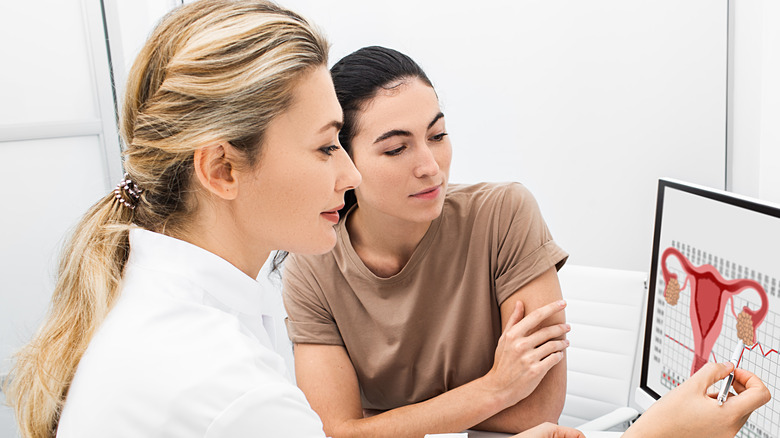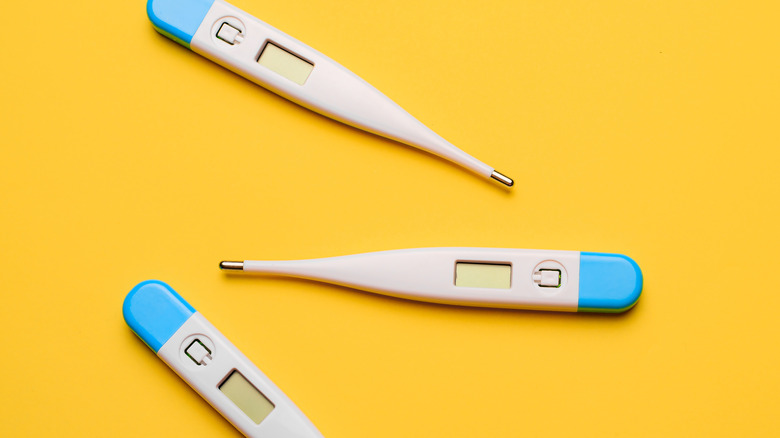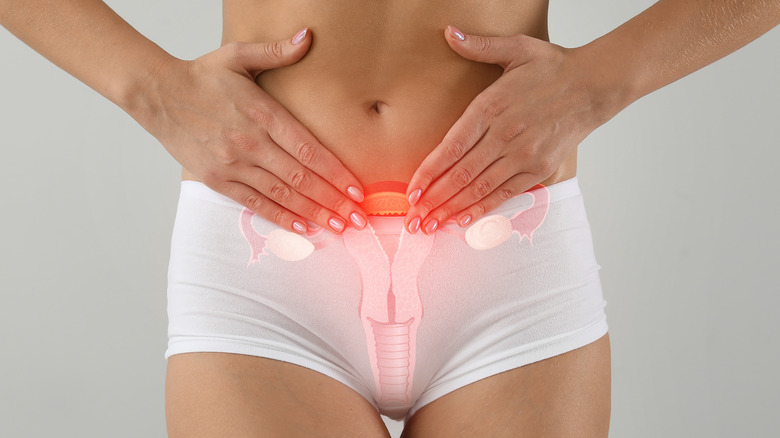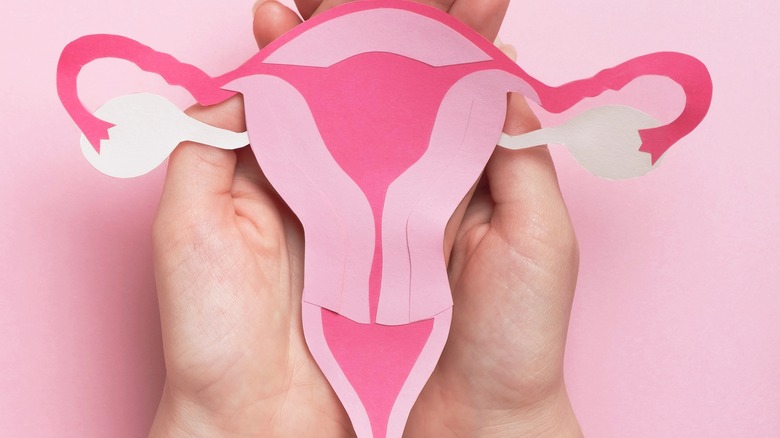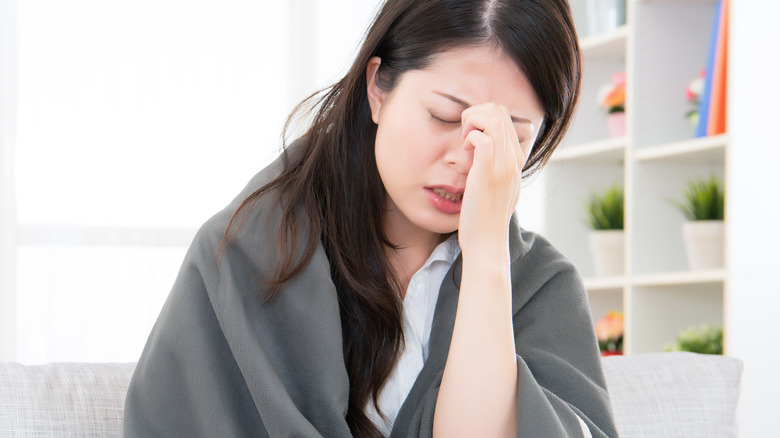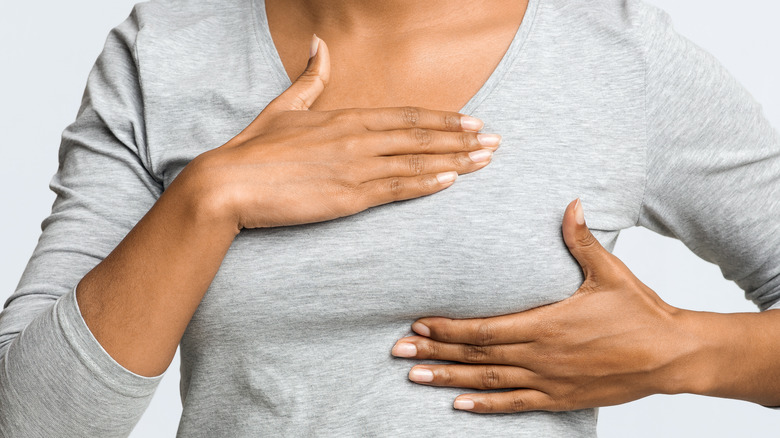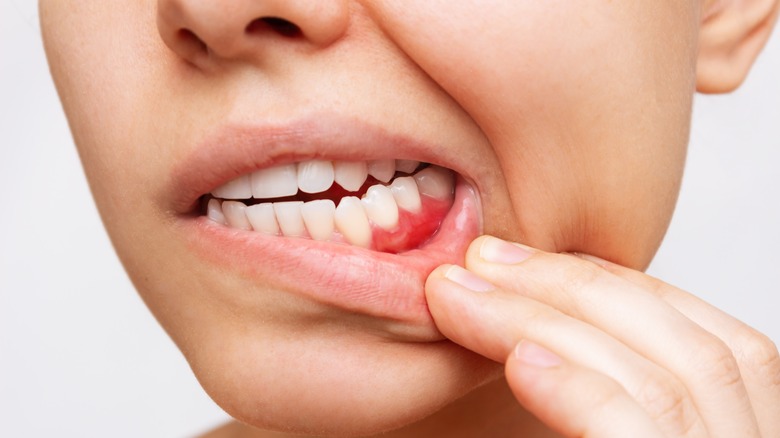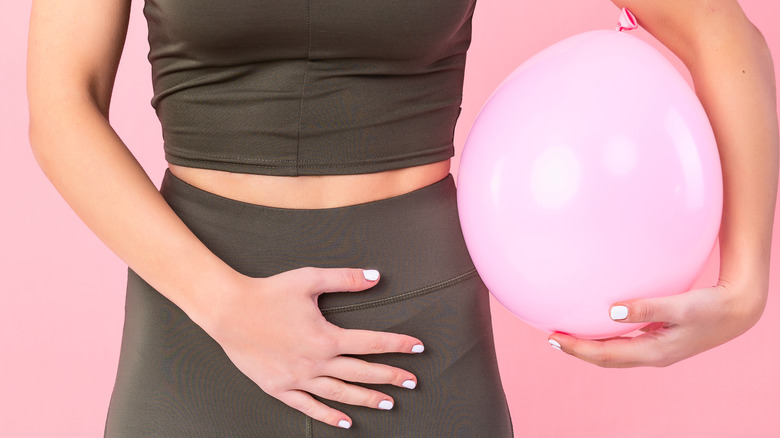What Happens To Your Body During Ovulation
While many of us are aware of what happens to the body during "that time of the month," otherwise known as your period, there is another part of the menstrual cycle that is less talked about, but also very important: ovulation.
The Cleveland Clinic defines ovulation as the time during your cycle when your ovary releases an egg. This typically occurs approximately two weeks, or 14 days, into your cycle. Experts explain that after the egg is released, it moves down the fallopian tube with the intention of being fertilized.
What triggers ovulation is the production of a combination of the gonadotropin-releasing hormone, follicle-stimulating hormone, and luteinizing hormone, which all work together to help mature and release the egg. Needless to say, there is a lot happening hormonally during ovulation. This hormonal cocktail not only helps to release the egg, but also triggers a series of additional side effects that you may have previously experienced, but never associated with ovulation. Headaches, an increased sense of smell, and changes in your appetite are just a few of the surprising side effects of ovulation. If you're curious to learn more, keep reading.
Your cervical mucus changes
Quite simply defined, cervical mucus is mucus produced by the cervix, per experts at The Cleveland Clinic. The site explains that depending on where you are in your menstrual cycle, the texture of your cervical mucus will fluctuate. Hormones are what trigger the changes in texture, and can also cause changes to volume and color. During ovulation, for example, cervical mucus tends to be clear and slippery. This texture allows for sperm to more easily swim through the vaginal canal to reach the egg for fertilization. If you're looking to get pregnant, experts at the site suggest tracking your cervical mucus to get a better idea of when you're most fertile. In the days leading up to ovulation, mucus tends to be "thick, white and dry," and will transform to "clear and slippery," right before and during ovulation. Fertility tracking this way is called "cervical mucus method of natural family planning."
While cervical mucus serves the purpose of helping to improve the chances of fertilization during ovulation, it serves other purposes at other times in your cycle. For example, it can actually be used to prevent sperm from reaching the cervix. The rise in progesterone after ovulation ends is what ultimately shifts the texture of mucus from wet and slippery to more dry.
Your body temperature increases
Another sign that you're ovulating is that things start to heat up — literally. Mayo Clinic explains that your basal body temperature, which is the temperature of your body when you're at rest, increases slightly during ovulation. People who are trying to get pregnant can actually measure their body temperature to help determine the best time to conceive. This method of fertility tracking is known as "The basal body temperature method," according to the clinic.
Planned Parenthood experts explain that a body temperature of anywhere between 96°and 98° Fahrenheit is normal prior to ovulation. However, after ovulation, body temperature can increase to 97°- 99°F. It's important to note that you are still fertile after ovulation. In fact, Mayo Clinic experts say you're still fertile about "three to four days after your basal body temperature rises."
If you plan to use this method to track fertility, Planned Parenthood says you have to keep a daily record of your temperature, and be sure to take it the same time and the same way each day. Additionally, you must take your temperature before doing anything, i.e. no talking, sex, using your phone — nothing — and you have to keep the thermometer in your mouth for five minutes. It's recommended to have at least three months' worth of data before using this method to help ensure accuracy. There are specific thermometers used to measure basal body temperature that can be found in drugstores.
You may experience pain
One of the more unpleasant side effects of ovulation is that it may sometimes be accompanied by pain. While experts at Healthline explain that ovulation pain may be harmless for some women in most cases, it can be a sign of an underlying condition in others.
Ovulation pain typically manifests on one side where the ovulation occurs, and may last anywhere from a moment to several hours. You may feel a "dull ache" or a sharp twinge, and the pain may also be associated with discharge. To understand why ovulation pain occurs, it's helpful to understand just how the egg is released from the ovary. Healthline experts say that when it's time for the egg to be released a follicular cyst swells, then ruptures, releasing the egg. During this process, it's possible for "blood and other fluid," to be released, entering the pelvic region and potentially causing irritation.
While a little pain may not be cause for concern, if it is extreme, it may be time to speak with your doctor. Over-the-counter pain meds, heating pads, and even taking birth control to stop ovulation may be potential treatments.
Your sex drive increases
Now, one of the more positive side effects of ovulation (and perhaps the best one of all): your sex drive is at an all-time high.
According to Medical News Today, research has shown that sexual activity tends to increase during the time a woman is her most fertile, and that a hormone named estradiol may be the reason behind it. Researchers believe that this hormone, which is a form of estrogen, "increases sexual arousal in females" right before ovulation occurs. The phase of the menstrual cycle when ovulation occurs is called the follicular phase. Arousal peaks toward the very end of this phase, which is before ovulation. Some studies even show that attitudes towards kissing are more positive during the late follicular phase, then drop during the luteal phase, which is after ovulation occurs.
WebMD also confirms that ovulation is connected with an increased sex drive, and thus sexual activity in women. The website says a survey found that sex increased by 24% during a woman's fertile time when compared to other times of her cycle. Having more sex during ovulation will obviously increase the risk of pregnancy, so be sure to take that into account before getting down to business.
Your skin may glow
If you've ever felt like you had a certain "glow" around ovulation, science says you're probably not imagining it. In this case, the glow you see is actually due to excess oil production, but it's probably just best to count your blessings here.
The skincare experts at Eminence Organic Skin Care demystified hormonal fluctuations throughout the entirety of the menstrual cycle, explaining that right before you ovulate, your estrogen levels are at their highest. During this time, your skin appears to be glowing and well moisturized (from all that oil), your pores may appear smaller, and your skin is also producing more collagen and elastin, which can help contribute to a youthful appearance.
Skincare expert Dr. Hazel of Murad backs up this sentiment, adding that the increased estrogen produced during the late follicular phase and ovulation also contributes to improving the skin barrier and can help heal wounds. The drawback of this is that due to the excess oil production, you may experience clogged pores, and thus breakouts. Another potential side effect is that estrogen can trigger the production of pigment, so you may want to take steps to protect your skin if you are prone to hyperpigmentation.
Your sense of smell may become heightened
While it might seem strange, this particular superpower has in fact been bestowed upon women as a result of ovulation. Scientific American notes that a study found that women who were ovulating and not on hormonal birth control were more sensitive to the smells of both musk and male pheromones than women who were on birth control.
Jessica McNeil, a doctoral student in psychology at the University of Ottawa's School of Human Kinetics, spoke to Scientific American and explained, "I believe these variations in olfactory sensitivity are closely tied to the functions of the reproductive system, where the capacity to identify certain odors increases at times when procreation is more likely." Another study published in the journal Nutrients also found that women's sense of smell increased during the ovulation period of the menstrual cycle, and that the degree to which she is sensitive to certain smells may fluctuate cycle to cycle.
Curiously, one of the side effects of pregnancy in the first trimester is a heightened sense of smell, also known as "hypersomia," according to experts at What to Expect. This is due to increased levels of estrogen, which are also at their highest leading up to ovulation (via The Cleveland Clinic).
You may experience changes in your cervix
Another interesting side effect of ovulation are the changes you experience to your cervix. According to the experts at Healthline, it is common for the cervix to experience changes in softness and position throughout your menstrual cycle, during pregnancy, and also during sex.
Paying attention to the position of your cervix can help you understand where you're at in your cycle and alert you of any important changes. For starters, the site explains that the cervix is located deep within the vagina, and is what connects the vagina to the uterus. If you plan on doing a self inspection, Healthline experts say that it may actually be difficult to do so during ovulation, because the cervix actually rises during this time, making it harder to reach. Other reasons that make it harder to reach include the fact that you may have a long vaginal canal, or that you're pregnant. Another side effect of high estrogen levels during ovulation, is that the walls of the uterus, as well as the cervix, will soften.
According to another Healthline article, the cervix will also open more during this time in an effort to allow sperm to pass through to the uterus. It will both drop and harden immediately after ovulation is over.
You may experience headaches
One undesirable side effect of ovulation is that it can actually trigger headaches or migraines. If you're assuming hormones are to blame here, you'd be 100% correct. According to Healthline, it's not uncommon for women to experience headaches at varying points of their menstrual cycle that are connected to rising and dropping hormone levels. The site says that fluctuating estrogen levels are the cause of these headaches, which means that as estrogen levels rise during ovulation, it can trigger them, as well as when they fall during the bleeding phase of your cycle. Per experts, migraines associated with your menstrual cycle may be more painful and uncomfortable because they are often combined with other symptoms.
Some of the symptoms associated with ovulation headaches include "throbbing pain in one or both sides of your head; visual disturbances like blurry vision, also known as aura; sensitivity to sunshine or bright lights; sensitivity to sound," and "nausea or vomiting," according to the site. Most of the treatments associated with menstrual headaches involve treating the dramatic spikes and drops in hormone levels, but you may also take over-the-counter pain medication, make sure to get more sleep, and stay hydrated.
You may feel nauseous
As if headaches weren't enough, nausea may also be an unwanted companion during this time of the month. Dr. Renita White, M.D., FACOG, a board-certified OB-GYN at Georgia Obstetrics and Gynecology, spoke to Romper on the subject of nausea and ovulation, and confirmed that "it is possible to experience nausea with ovulation." And you guessed it — hormones are behind it all. This time, however, it's not estrogen, but the hormone called the "luteinizing hormone," which spikes right before ovulation. This hormone can actually affect your digestive system, which is what can contribute to feelings of nausea.
If you are feeling nauseous as you ovulate and are partially worried that pregnancy is to blame, White explains that you shouldn't have anything to worry about. "At the time of ovulation, it is too early to be pregnant. And it does not correlate if sperm meets with the oocyte that was just released." Luckily, the discomfort shouldn't last long. While it is not uncommon to experience nausea during this time, if the pain is excessive, interferes with your daily life, or is accompanied by infertility, you may want to visit your doctor.
Your breasts (and nipples) may become tender
While you may have experienced tender breasts before as a symptom of PMS, it's also possible to experience it as a side effect of ovulation as well.
According to experts at Healthline, sore and achy breasts and nipples are not an uncommon occurrence around ovulation. The pain may be either mild or severe, and can show up in either one or both breasts or nipples. The name for breast pain that is connected to the menstrual cycle is called "cyclical mastalgia," and is a result of fluctuating hormone levels. Experts explain that the pain usually lasts from the start of ovulation, and can continue until your period begins. Unfortunately, despite the research, scientists haven't pinpointed the exact reason why hormones trigger painful breasts and nipples around this time.
Furthermore, it's important to note that there may be other reasons behind your sore breasts and nipples, including being pregnant, a skin condition, or certain medications. While sore breasts are not typically a symptom of cancer, it can be in some cases, so be sure to check for other symptoms associated with the disease and make a doctor's appointment if necessary. Treatment for sore breasts and nipples includes taking over-the-counter pain medication, avoiding caffeine, and potentially going on hormonal birth control.
You may experience dental problems
One of the weirder side effects of ovulation is that you might experience changes in your teeth. Yep, you read that correctly.
WebMD experts explain that skyrocketing levels of both estrogen and progesterone could "exaggerate your gum's sensitivity to plaque and bacteria." This sensitivity may lead to bacterial infections, and can also cause bad breath. Other dental side effects include red, swollen gums that are prone to bleeding, as well as cold sores or canker sores that show up in those who may already experience them.
Susan Karabin, D.D.S., past president of the American Academy of Periodontology, spoke to Women's Health about the connection between hormone levels and dental health. "The gingival tissues have lots of estrogen receptors that respond to hormonal fluctuations. As a result, you may see symptoms appear in your mouth in accordance with your menstrual cycle." Karabin suggests going in for teeth cleanings and other procedures right after your period ends (which is when estrogen and progesterone are at their lowest), and you'll experience less sensitivity.
Your appetite may decrease
If you've ever found yourself turning down a plate of your favorite dish around ovulation, there is a scientific reason behind your lackluster appetite.
Science Daily cites a study that found that estrogen — which spikes right before and during ovulation — can actually behave as an appetite suppressant. As Tamas L. Horvath, chair and professor of Comparative Medicine and professor in the Department of Obstetrics, Gynecology & Reproductive Sciences at Yale School of Medicine, explained, "We found that estrogen suppresses appetite using the same pathways in the brain as the adipose hormone leptin." According to The Cleveland Clinic, leptin is a hormone that is found in body fat that your body releases to regulate hunger and help signal to your brain that you are full.
Another study published by The American Journal of Clinical Nutrition that evaluated the food intake of 18 healthy women with menstrual cycles found that energy intake was at its lowest during the ovulatory phase when compared to other times of the cycle.
You may have more energy
One pretty amazing benefit of all that estrogen coursing through your body during ovulation is that it can give you a nice boost of energy. Experts at Self explain that energy levels are typically at their highest during this phase of the menstrual cycle, and that you might even want to take advantage of this boost by getting in some intense workouts, such as HIIT.
As for why this happens, Dr. Amy Beckley, PhD, inventor of the at-home ovulation test Proov, writes on her website that "Estrogen is responsible for an increase in cortisol and testosterone levels, which naturally increase energy levels." She suggests exercises such as running and cardio, as your body may be able to "push through" the workout more so than other times of the month. She also recommends strength training because estrogen also improves circulation and increases strength, helping you get the most out of your workout.
In addition to the surge in physical energy you may be experiencing, estrogen can also help boost your mental faculties as well. Vitti explains that the increased estrogen at the time of ovulation "creates peak verbal and social skills" (via Self). For this reason, it may be a good time to tackle tasks such as business meetings, which require teamwork or social finesse.
You might bloat
If you thought that bloating was only limited to your period, science has some other news for you. While it might not be as common or severe as the bloating you experience during your period, it may happen nonetheless.
Experts at The Nordica Fertility Center explain that estrogen dominance, which is what happens when estrogen is elevated in the body, can contribute to increased water retention, and thus bloating. Dr. Holly Thacker, director of the Cleveland Clinic Center for Specialized Women's Health, spoke to Today and confirmed what the fertility center reports. "When estrogen is high, women seem to retain more water." She also said that while it is annoying, there's typically nothing to worry about if you find yourself boated during this time. "Many women worry that something really bad is going on, and part of our job as doctors is to reassure them that sometimes bloating is really nothing more than just bloating. But we all know it's not much fun."
To lessen any bloating, she suggests eating foods rich in magnesium, including "spinach, peas, almonds, fish, avocados and whole grains," which have been shown to help decrease bloat, per Heathline.

